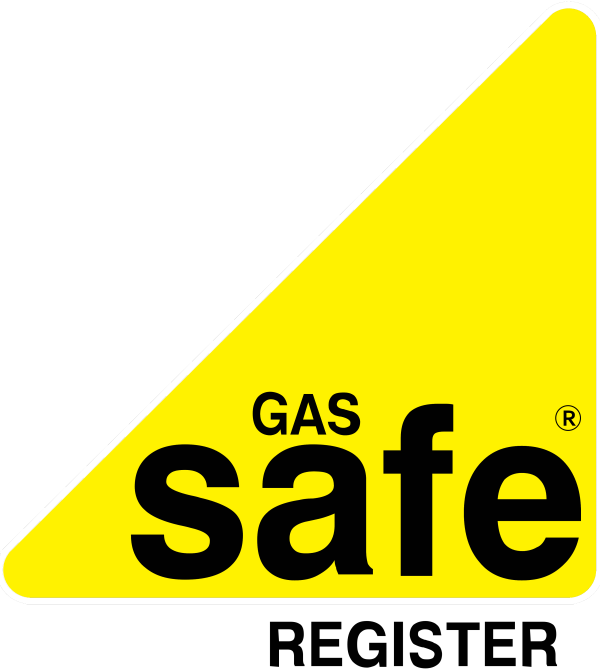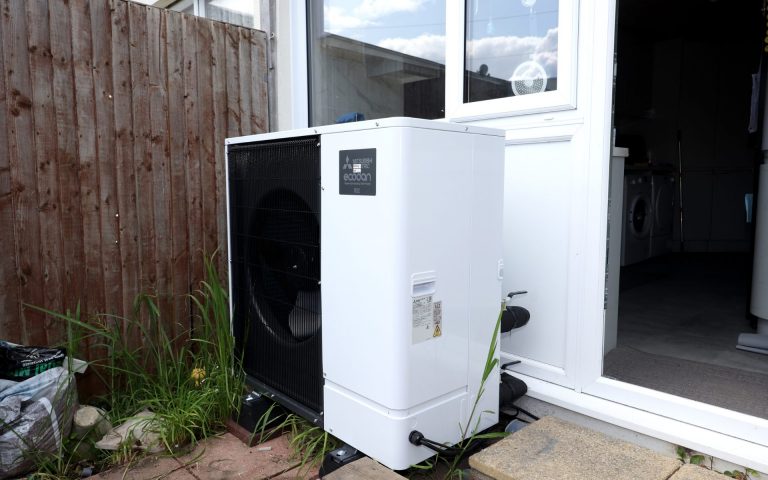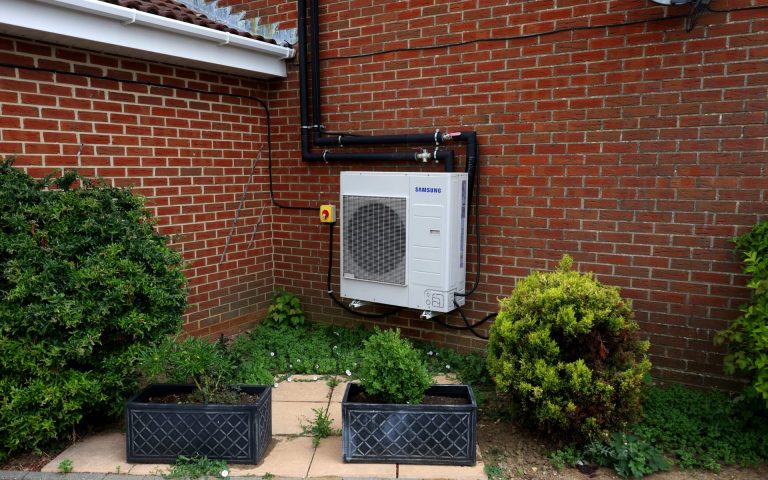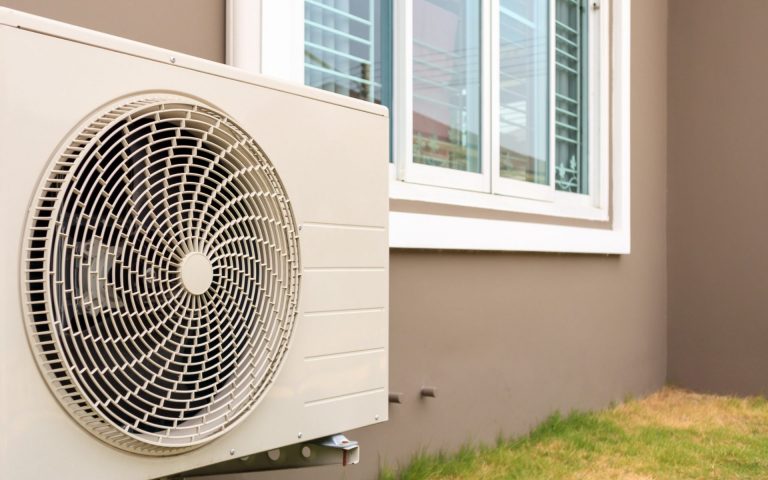COP26 has begun and the world’s eyes are fixed firmly on what we are going to do about climate change.
Last week we blogged about Heat Pumps and how they are a renewable alternative to gas boilers. This week we’ll be looking at the Air Source Heat Pump in a bit more detail and whether the advantages make the switch worth it.
What is an Air Source Heat Pump?
Air Source Heat Pumps are a renewable technology that can be used to heat your home. They work by extracting heat from the air outside of your home. A large fan is placed outside the home which draws in air. The natural heat in the air is increased by compression and then transferred to a water cylinder. That heated water is then ready to use for your taps and a wet central heating system.
If you are envisioning a typical British Winter and wondering how on earth is this Air Source Heat Pump ever going to work – Don’t worry! This technology can work in temperatures as low as -25 degrees C.
What are the Advantages of an Air Source Heat Pump?
Let’s take a look at the advantages of using an Air Source Heat Pump to heat your pump and provide your hot water.
- Air Source Heat Pumps can reduce your energy bills
Depending on your current heating system, an Air Source Heat Pump could potentially lower your energy bills due to their high efficiency.
- You may be eligible for the Green Homes Grants scheme
The government’s Green Homes scheme includes Air Source Heat Pumps, meaning you can apply for a voucher worth up to £5K to go towards two thirds of the installation costs. This grant goes up to £10K for low income households and is available until March 2022.
- Air Source Heat Pumps are a green heating solution
Air Source Heat Pumps use electricity to run so don’t produce carbon whilst they are operating, unlike the more common gas boiler. You can even go a step further and install solar PV panels, providing clean electricity on which the Air Source Heat Pump to run. You may also want to consider using a renewable energy supplier.
- You can use an Air Source Heat Pump all year round
As we said above, any worries about not being able to generate heat in the colder months can be dispelled. Air Source Heat Pumps can be used in temperatures as low as -25 degrees C. Did you know that you can even make use of your Air Source Heat Pump during the hot summer months (or weeks for us Brits) as many of the Air-to-Air heat pumps can be used to circulate cold air in your home. So not only can you keep your home cosy in the Winter, you can also cool everyone down in the Summer!
- Air Source Heat Pumps are easy to maintain
As with most appliances, and certainly gas boilers, it’s always recommended to get Air Source Heat Pumps serviced once per year to check it’s in good operating condition. However, Heat Pumps are known for being very easy to maintain and need very little maintenance to keep your home heated.
- Air Source Heat Pumps last a long time
The average operating life of an Air Source Heat Pump varies by model, but you would usually be looking at about 20-25 years of use.
What are the Disadvantages of Air Source Heat Pumps?
Well so far it seems a bit of a no brainer – What’s not to love about Air Source Heat Pumps? Well as with most technology, including renewable sources, there are some disadvantages to consider as well.
- The installation of Air Source Heat Pumps can be tricky
Air Source Heat Pumps are much easier to install when a new house is being built. Of course, it depends on your property, but it can be very difficult to install an Air Source Heat Pump without having to make significant changes. These changes can be costly and very disruptive to your home. If you live in a flat or a property with no outside space, then it isn’t well suited to an Air Source Heat Pump. Likewise, if you don’t have space for the hot water cylinder it isn’t going to work either.
- There is some operating noise from Air Source Heat Pumps
Whilst many old boiler models and heating systems can be loud and clunky, most modern boilers are fairly quiet nowadays. The same can be said for Air Source Heat Pumps. Whilst they will make some noise whilst in operation, most homeowners with this renewable technology don’t consider it to be a problem. Before installation it’s worth considering the placement of the Heat Pump and choosing an area away from bedrooms and main living areas to limit any potential disruption.
- Air Source Heat Pumps can cost more to run than A rated boilers
Air Source Heat Pumps are more environmentally friendly as they run on electricity. Even though it’s only a small amount of electricity, it’s still up to 4 times more expensive than gas per unit. This means that if you have an A rated boiler which is working efficiently, choosing to replace it with an Air Source Heat Pump could actually end up increasing your energy bills.
- Air Source Heat Pumps are less efficient during the Winter
Whilst Air Source Heat Pumps can operate in low temperatures, they do have to work harder to extract the heat when it’s colder outside. This means that Air Source Heat Pumps will use more electricity during the cold Winter months, making them less efficient when they are needed most.
- Your home needs to be well insulated for an Air Source Heat Pump to be effective
For Air Source Heat Pumps to be an efficient system, the home needs to be well insulated as they produce hot water at a lower temperature than boilers.
- You may need to make other home improvements for an Air Source Heat Pump to your home effectively
Due to the fact the temperature of the water is lower, you may find that some homes will require larger radiators to be installed in order to be able to effectively heat the room. You may also want to consider under floor-heating so the heat delivery system has a larger surface area.
- An Air Source Heat Pump needs outdoor space
The Heat Pump itself requires quite a bit of outdoor space, not only for the unit but so it gets an adequate supply of air from around it. Inside your home you will also need space for a large water cylinder. When placing the Air Source Heat Pump in an outdoor space, it’s worth considering where it would get the most sunlight as the more it gets, the less hard it will have to work.
How much could I save by installing an Air Source Heat Pump?
Depending on your current boiler, you could potentially be saving up to £900 on your energy bills each year by installing an Air Source Heat Pump instead.
However, if you have a new gas or oil boiler with an ErP A rating, then you would be better off keeping that rather than replacing it with an Air Source Heat Pump.
If you have an older boiler, or one that uses coal or electricity then switching to an Air Source Heat Pump could see you making significant savings on your energy bills every year.
An Air Source Heat Pump produces 3 times more energy than what it uses, in comparison to even the most efficient boilers which waste up to 12£ of the energy they use.
As Air Source Heat Pumps use electricity, if you are thinking of making the switch then do make sure you are on the best electricity tariff available.
How much does it cost to install an Air Source Heat Pump?
To have an Air Source Heat Pump installed in the ‘typical’ home, you would likely be looking at a cost of between £4K and £11K. This sounds like a large amount of money, however if it heats your home more efficiently than your current boiler and heating system then you could be enjoying 20 years of lower energy bills.
There are of course different Air Source Heat Pumps with slightly different price tags so have a look at the options available, as well as any green grants that could help with the costs.
How do I know if an Air Source Heat Pump would be right for my home?
If you are a homeowner enjoying a modern A rated gas boiler, then you can be assured that you are using an efficient heating system to heat your home. The great thing about modern boilers is that they are much more energy efficient than previous, older models from 10 or more years ago. If you already have an efficient boiler, then you could actually end up paying more to run an Air Source Heat Pump on electricity.
If by installing an Air Source Heat Pump, you would also be needing larger radiators, underfloor heating and significant home improvements to install it then you could be looking at big costs.
However, on the plus side, if you install an Air Source Heat Pump you can breathe easy that you’re not contributing to the carbon going into the atmosphere from gas boilers. You can also rest safe in the knowledge that any Air Source Heat Pump you install will likely last longer than a new boiler would.
If you are considering moving into a new build house or you have a well-insulated home, then installing an Air Source Heat Pump could be a great long-term investment for your property. Not only would you be reducing your yearly carbon emissions, but you could be lowering your energy bills too!
We’re ready to install Air Source Heat Pumps
If you think that an Air Source Heat Pump could be an option for your heating system then give us a call here at Aura Heating. We have qualified heating engineers ready to install Air Source Heat Pumps across the South Coast and South of England. Give our friendly customer service team a call today and we can arrange an estimate.






